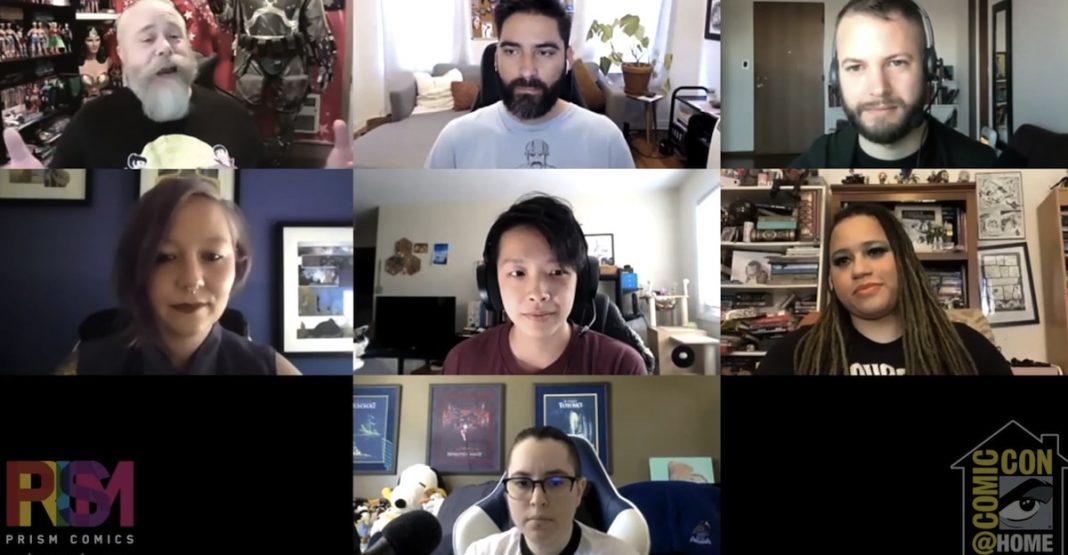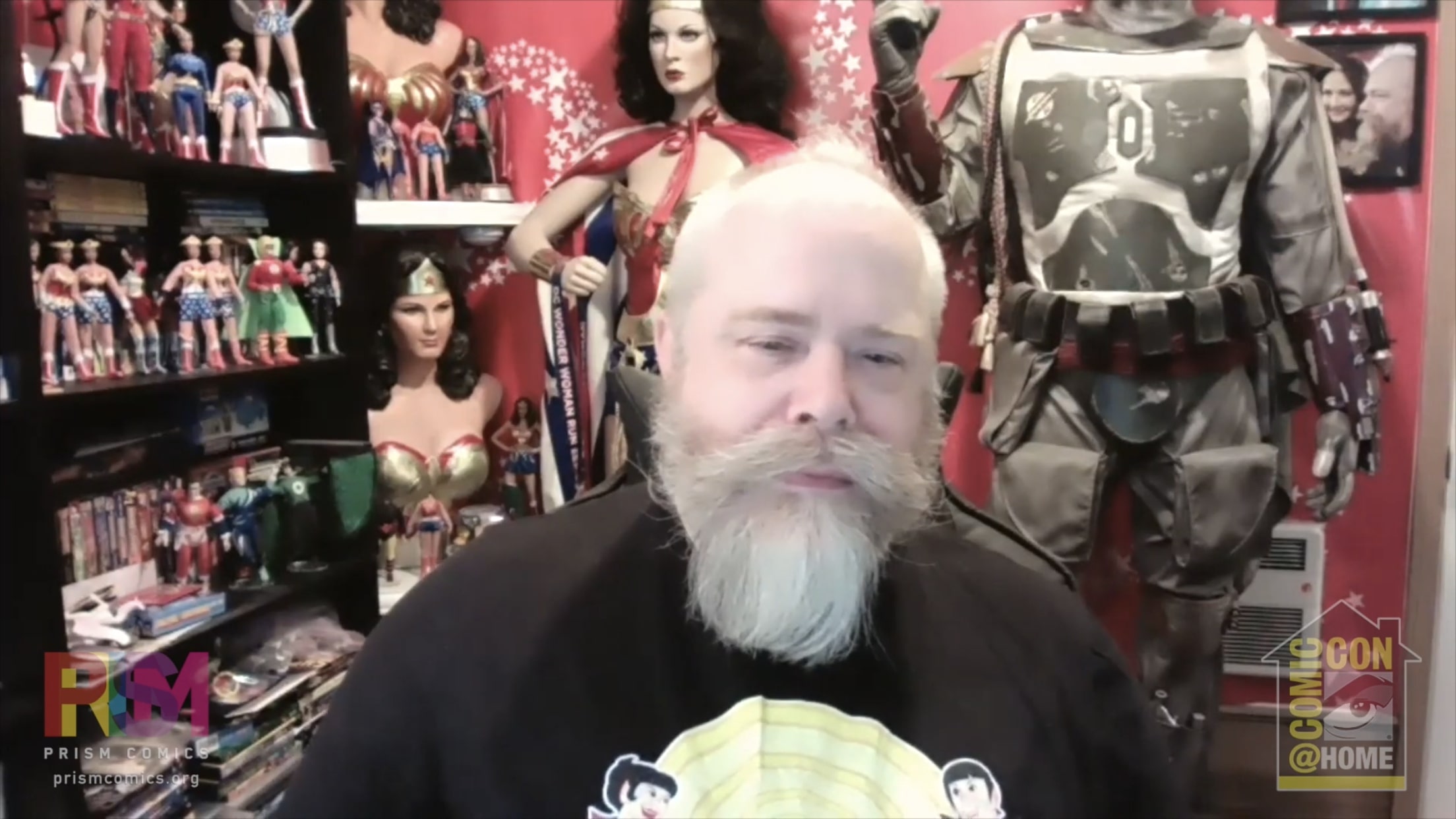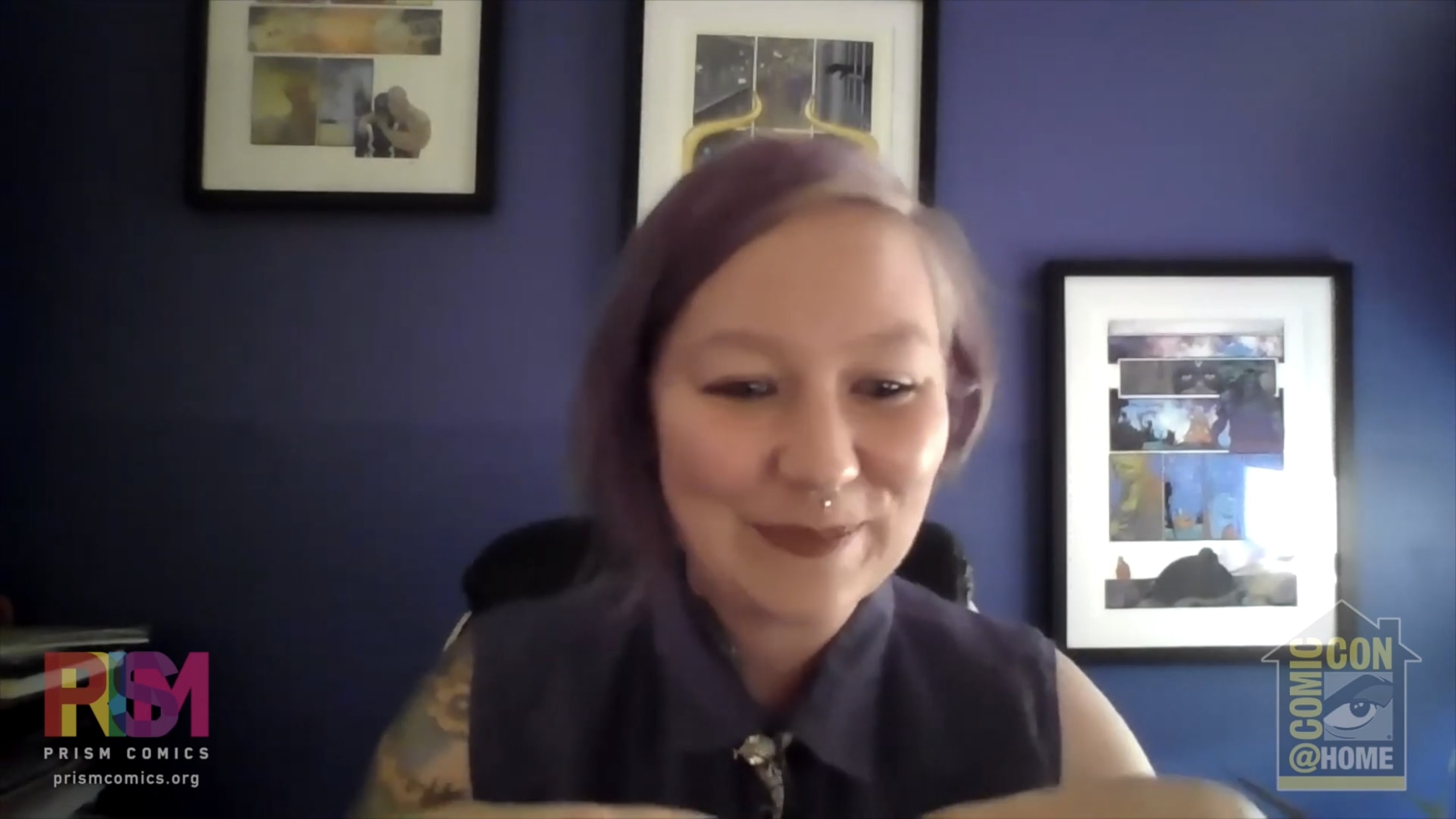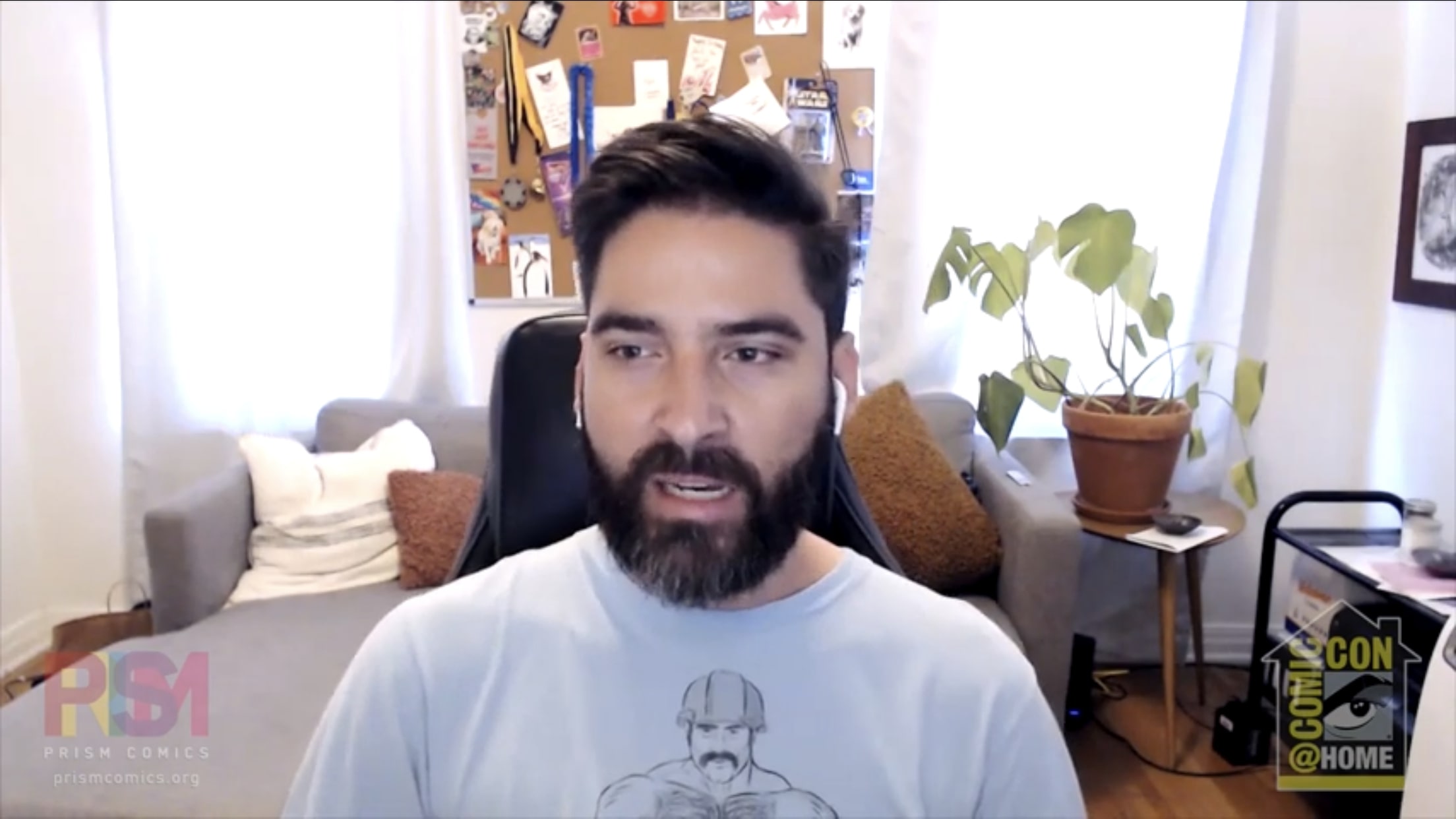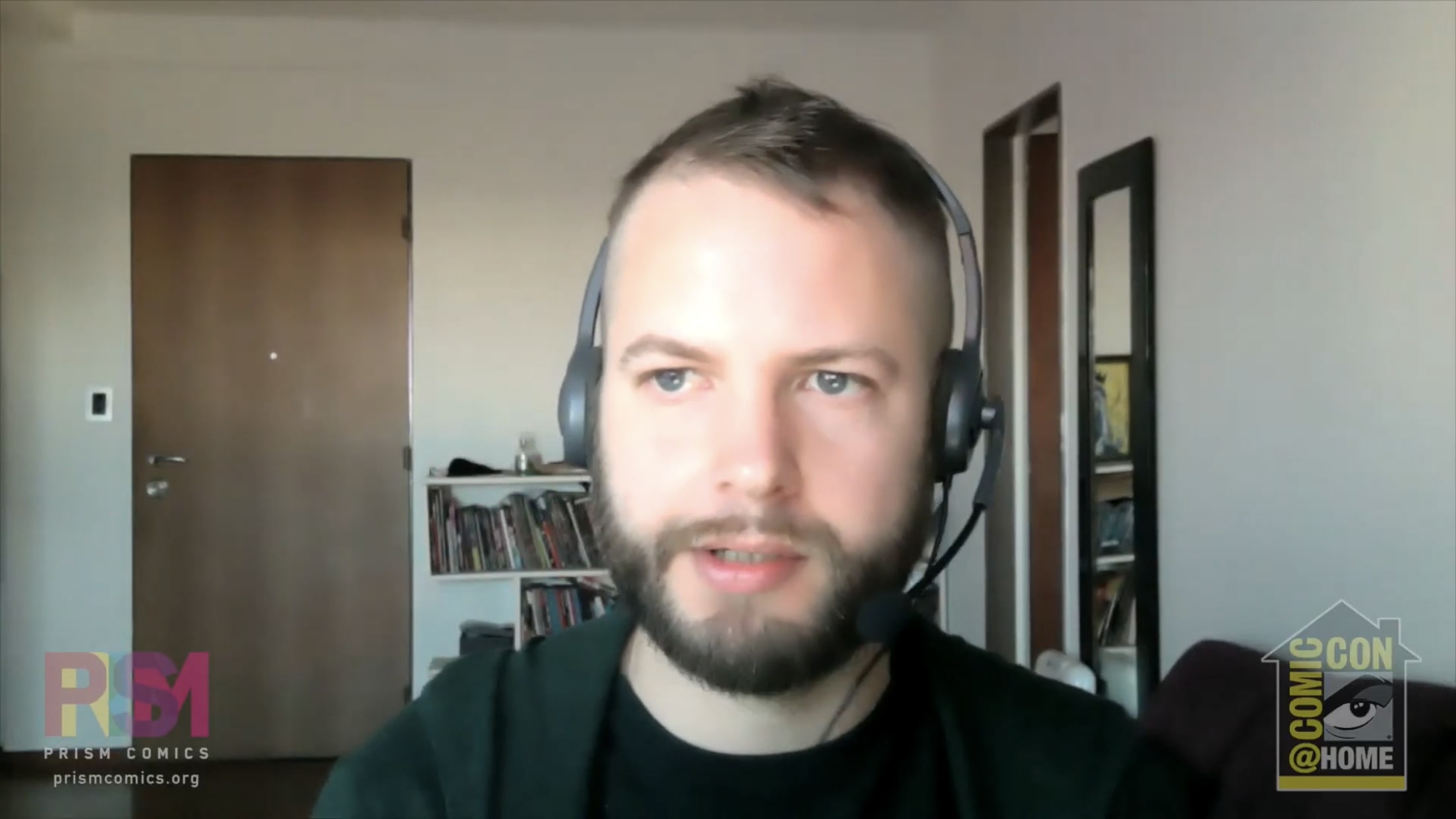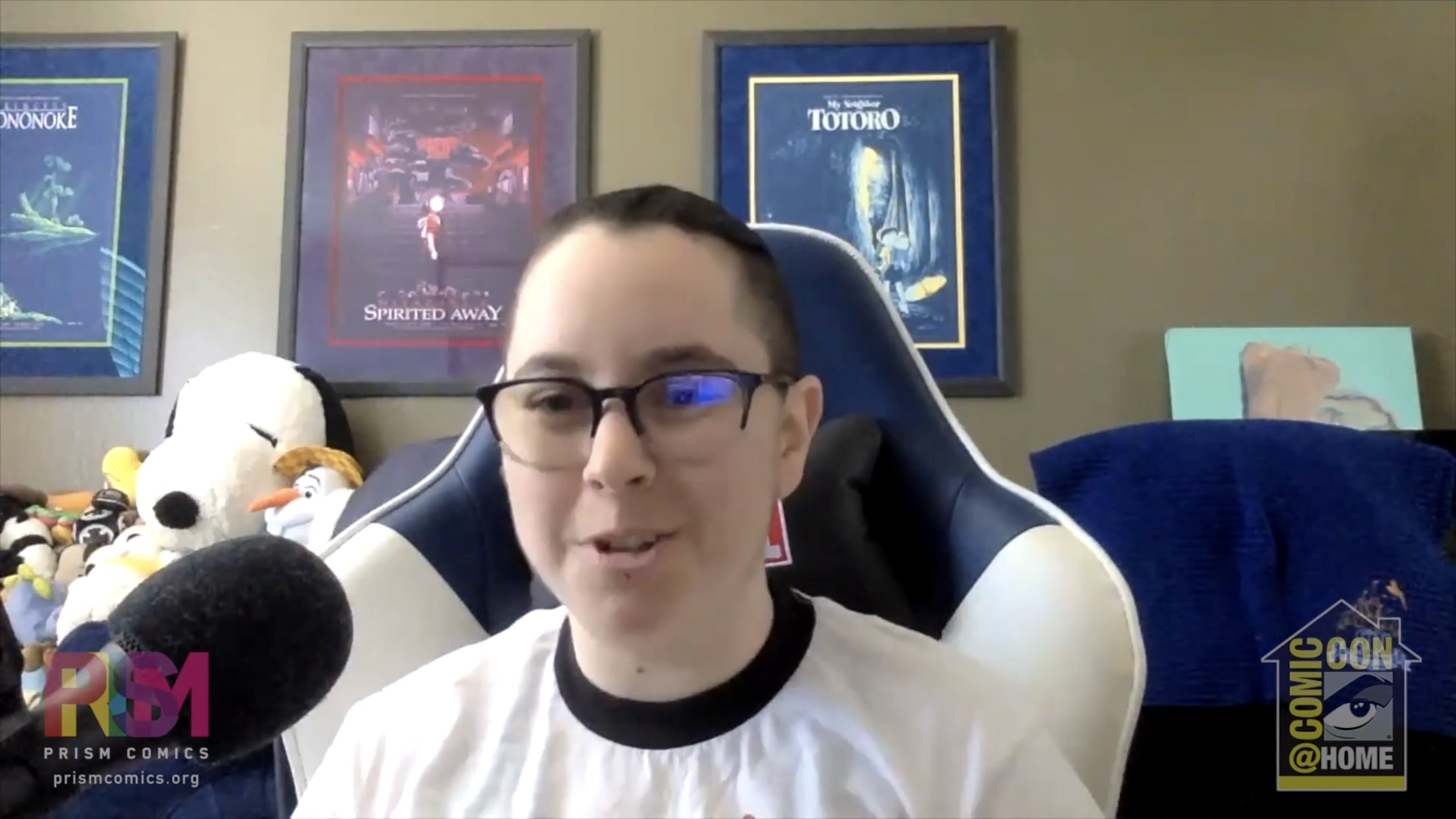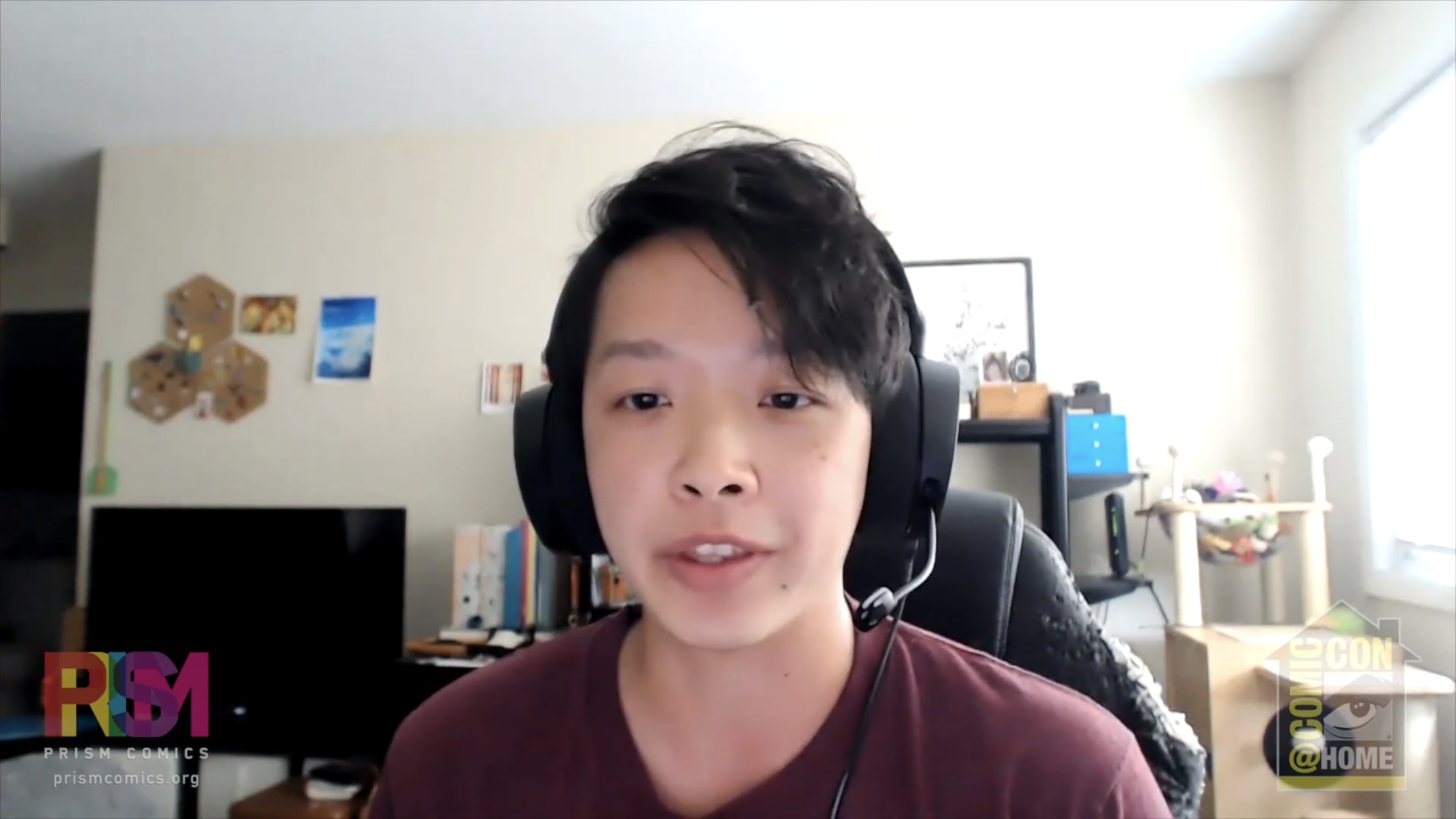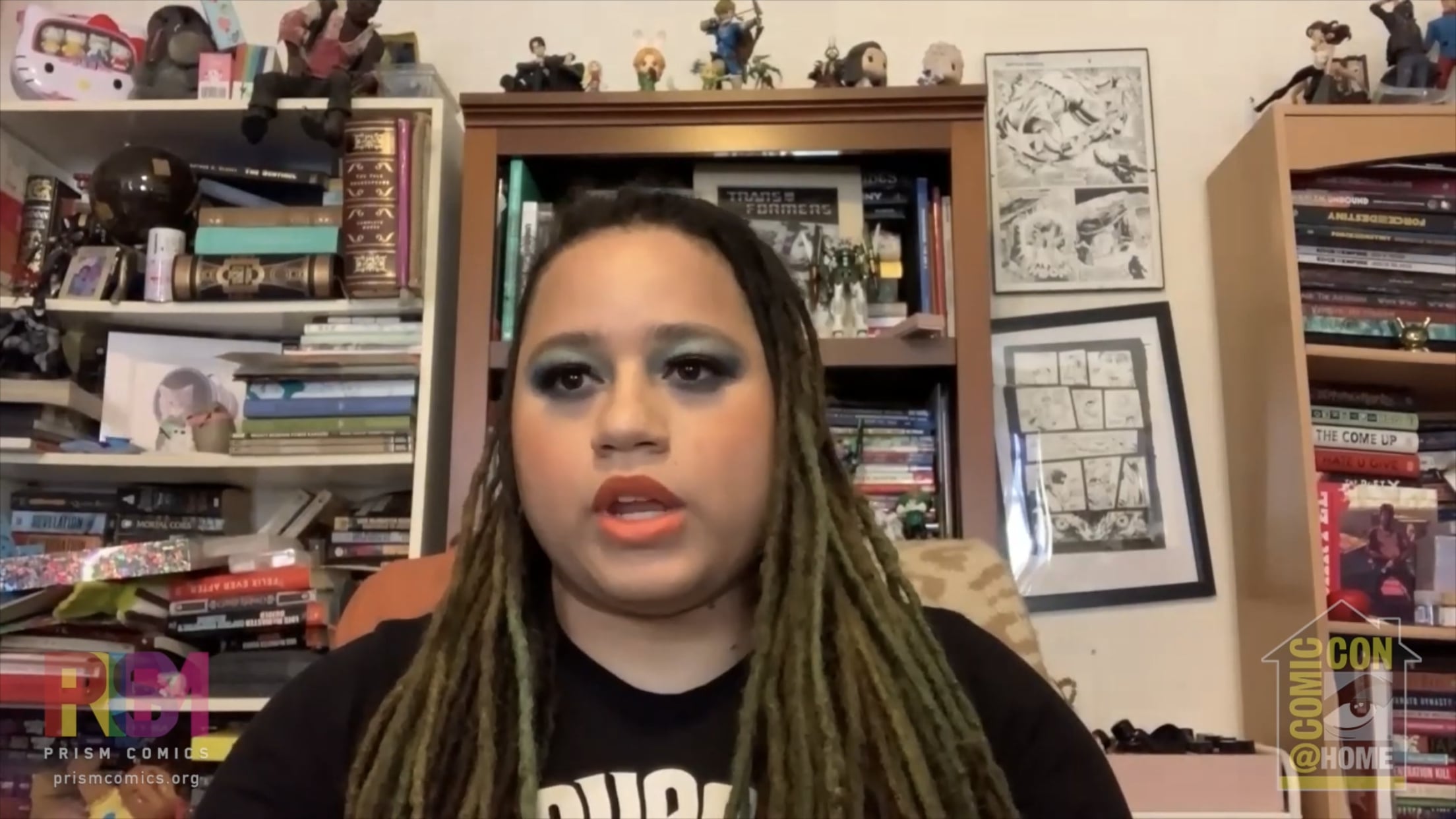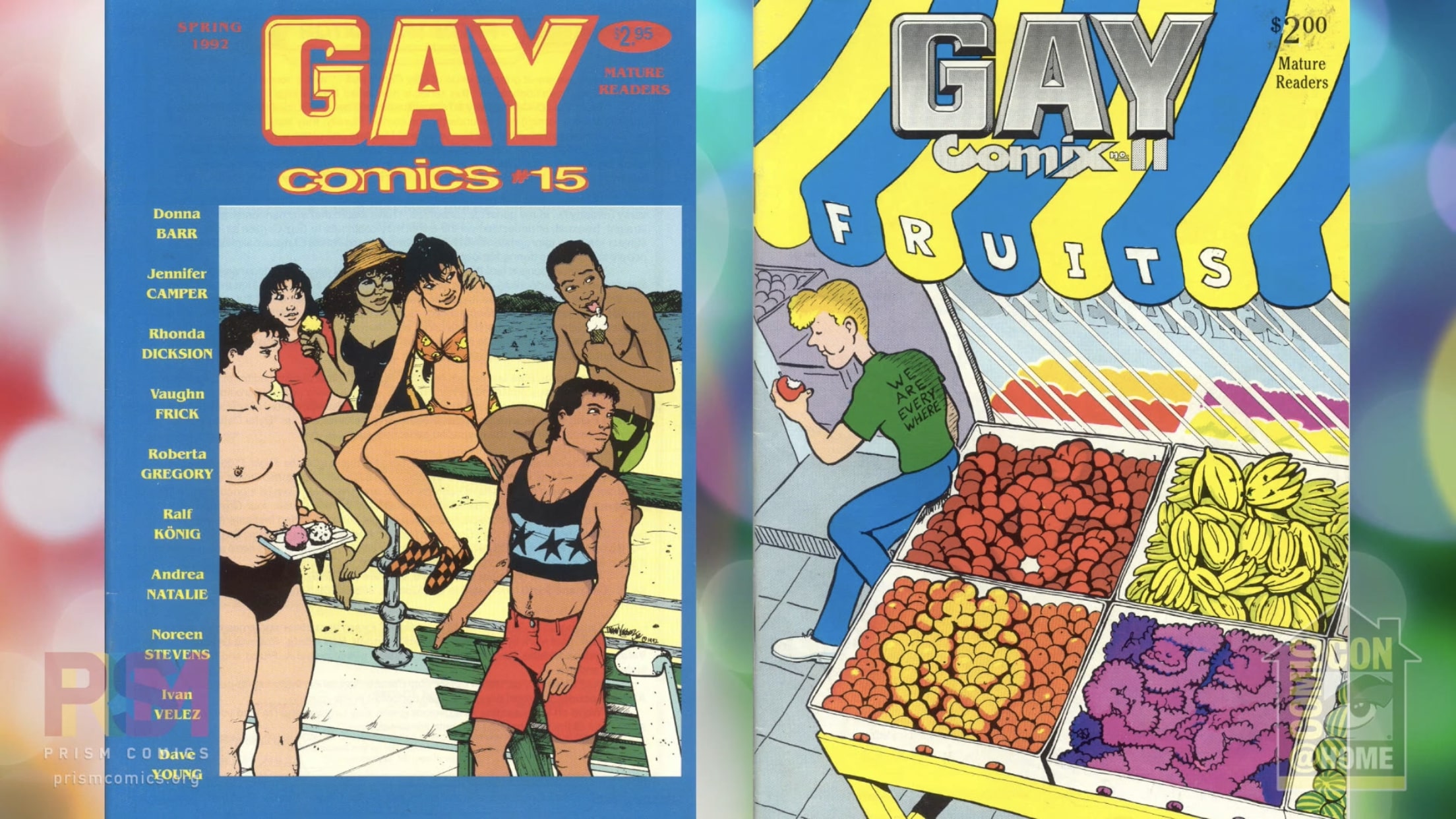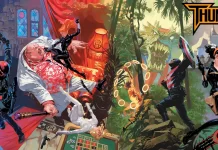On Saturday, July 24th, 2021 at 4:00 PM, “Out in Comics Year 34: Mainstreaming,” presented by Prism Comics, was released for streaming on YouTube.
The panel was hosted by founding moderator Andy Mangels (Wonder Woman ’77 Meets the Bionic Woman), and featured panelists Sarah Brunstad (editor at Marvel Comics, including Marvel’s Voices: Pride), The Kao (Magical Boy), Nina Taylor Kester (program coordinator at the Cartoon Art Museum), Danny Lore (Queen of Bad Dreams), Josh Trujillo (The United States of Captain America), and Luciano Vecchio (Marvel’s Voices: Pride and DC Pride #1).
Out in Comics
The first Out in Comics panel took place in 1988 (when it was known as “Gays in Comics”), but Mangels noted that Out in Comics was more relevant than ever before, with comics having truly hit the mainstream pop culture consciousness. Mangels, the first out gay comics professional, has moderated the panel for 30 out of its 34 years. He opened the panel by asking whether, in world where both Marvel and DC had released Pride issues, queers in comics have truly hit the mainstream.
After introducing the panelists (which included integrated on-screen graphics featuring each panelist’s respective work in turn), Mangels asked each panelist to share what they felt was their best work, and what it meant to be “out” in comics.
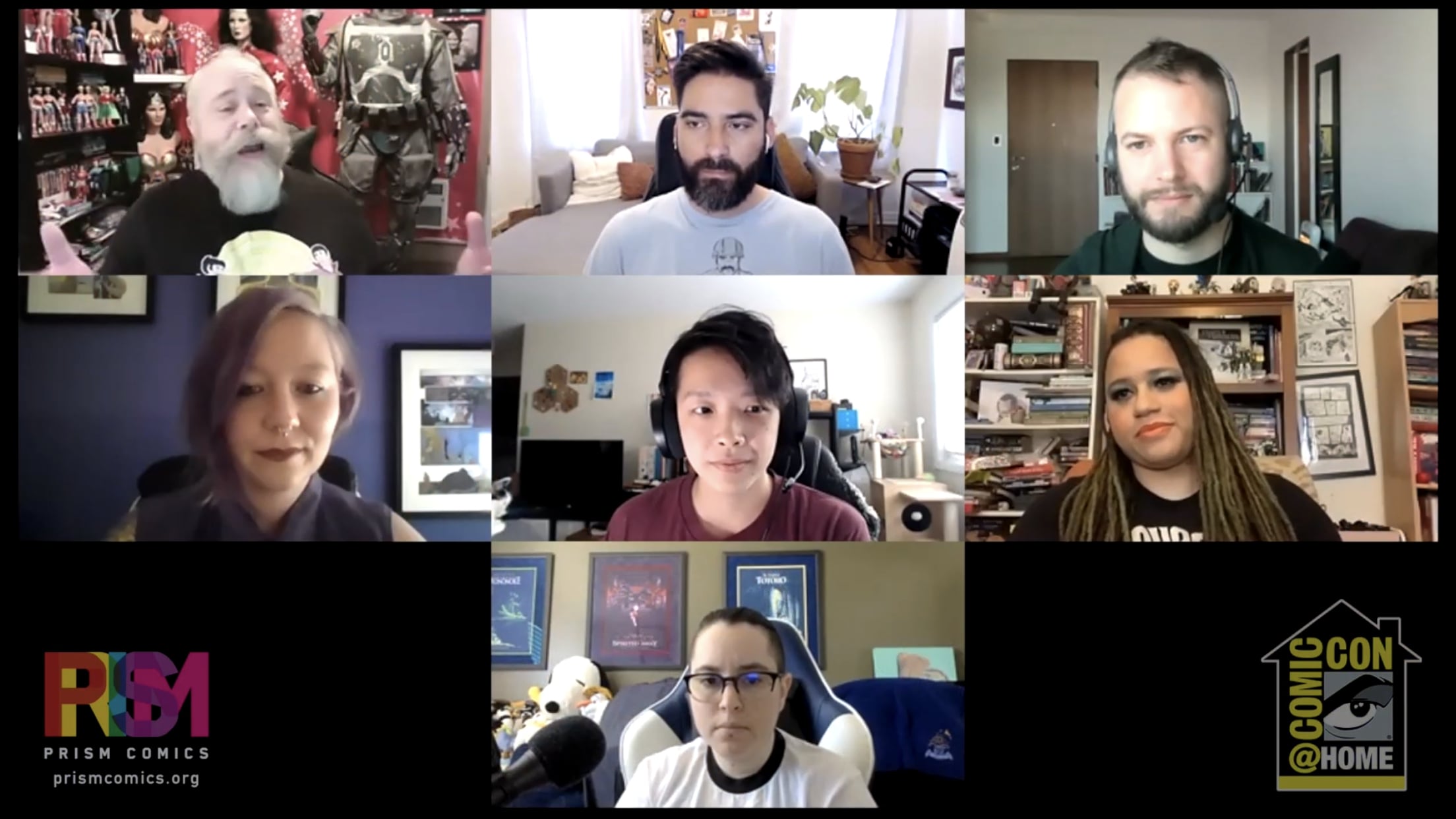
Lore stated that they had been out since they had entered comics, and said that all parts of their identity had been appreciated in the industry since the start. In fact, they said that the fact that they spoke openly about representation had helped their career (with the exception of some of the worst representatives of the internet, which as they pointed out, seems inevitable).
Lore went on to state that one of the most important things to them is making sure that other queer people feel welcomed in comics, emphasizing how essential it is to build community.
Trujillo said that being out in comics was about honesty, and stated that in his nonfiction comics, he tries to understand how the past affects the present, a theme that emerges in his other comics work. Trujillo said that he was especially interested in seeing how people react to Aaron Fischer, who reflects many of the struggles faced by some members of the queer community.
Kester emphasized how important the work done by our queer progenitors in the industry has proven to be in building a comics community where everyone can be themselves, citing the Prism Comics booth at cons, built by Ted Abenheim and others, as an essential component to being comfortable with being out in comics – not to mention an avenue for making connections that lead to future work and success.
Vecchio explained that earlier in his career, he more often found himself in spaces that were dominated by cis-het men who would expect him to take part in the casual homophobia. In response, he was driven to be more honest about himself, a process that began to show through in his indie work but which eventually made its way into his mainstream art, as well.
Brunstad said that she never felt that she had to hide her queerness in professional spaces, and acknowledged that for all the problems Marvel and DC still have, she has never felt compelled to be anything other than herself. Brunstad said that while she did feel that the Marvel Pride anthology should have first been released thirty years ago, she feels grateful that she got to edit the inaugural issue.
The Kao also feels as though he has been embraced by the comics community, referring to the fact that his series Mondo Mango is a diary comic which included his first gay relationship when he entered into it.
“Are we a niche, or a marketing fad?”
Mangels asked the panelists whether, given the mainstream success queer comics are currently enjoying, our presence in the industry occupies a “niche corner” of comics, or a marketing fad.
Trujillo said that although he might have been worried about such a designation a few years ago, he said that currently, queer comics have attained the critical and mainstream success needed to transcend such categories.
Lore said that they felt as though completely considering the situation “a victory” would be a mistake, as there is ongoing work to be done, but said that they do feel there was a sense of success in making the mainstream.
Brunstad said that one of the areas that the industry could still improve is to have queer people in the highest positions of comics, noting that at this point, Pride initiatives do have some sense of exploitation since its coming from a capitalistic perspective that mostly benefits the cis-het people at the top of the pyramid. Brunstad noted queer creators, and trans creators in particular, are often pigeonholed into telling a particular kind of story, rather than being afforded the creative freedom other creators are given in their storytelling.
Kester said that while progress has been made in representation, it is an ongoing battle that you have to stay on top of in order to maintain.
Vecchio noted that the mainstream always takes too long to catch up with what’s happening in the margins, and noted that since this panel has been going on for three decades, it seems as though we should be further along that we are.
The Kao noted that the LGBTQ+ community was so large that we have only begun to explore the stories that we have to offer.
Mangels noted that the newcomers to the queer community in comics are standing on the shoulders of those who have come before, observing that a few decades ago, to come out in comics was to put your career on the line. He said that highlighting this history was one of the personal goals he has that he considers to be of the utmost important.
What’s it like being an out creator in comics?
Mangels asked the creators to elaborate on the practical realities of being an out creator in comics.
Kester noted that she was working at Archie Comics when Kevin Keller was debuted, and she and another queer woman were consulted to ensure that the character’s introduction was authentic to the experiences taking place at the time. Kester said that for any subscription that was cancelled because of the introduction of Kevin, they got at least one new one, from a reader who responded to the content.
Kester noted that after working at Archie, when looking for a new position, certain companies would say that they did not want to center queer content. However, a few years later, Kester noted that the queer content had nevertheless made its way to the front of those company’s offerings.
Brunstad reflected on one of her first jobs at Marvel, working with writer Gabby Rivera on America. While Rivera had been an established prose writer, her work on America was met with doxxing online, and Brunstad noted that Marvel was unprepared to deal with the situation.
Brunstad elaborated that people like fellow Marvel junior editors Heather Antos and Alanna Smith went in to the men in charge and said that online harassment was a problem that needed to be addressed. Brunstad said these conversations are uncomfortable and ongoing, and Marvel was still trying to figure out how to protect creators and provide safe online spaces.
Lore said that their identity has always been out in the open, professionally, as well as being open about their Blackness and being an adult with ADHD. However, they said that in instances where they had worked with companies that weren’t as good behind the scenes also did a poor job marketing the books to the proper audience.
Lore noted that these situations would culminate in the companies being perplexed that the books were well-reviewed but sold poorly.
“Because you marketed my book to a bunch of white straight dudes, I don’t know what to tell you,” Lore said.
Lore noted that there was no way for an individual creator to adequately market their book, especially when compared with the resources companies have: if they choose not to put those resources behind a queer book, its no wonder they don’t sell as well.
Kester noted that many companies don’t take the time to think about how a queer comic might need to be marketed slightly differently than established queer books.
Trujillo shared that early in his career, he was told to play down his queerness, both in terms of his professional output and how he presented himself, and was even advised to change his last name. Trujillo said it took a lot, internally and externally, for him to want to continue to make comics after such an awful experience.
Vecchio said he tried to think about companies not as enormous, amorphous entities, but rather as collections of individuals, and he said he has been lucky to have worked with the right people. Vecchio said that he hopes that as more queer people take more editorial positions, we’ll consider to see limitations fall away.
The Kao said that he felt lucky that he had found queer readers, and that he was pleasantly surprised that Scholastic was interested in publishing Magical Boy, which he had expected to have to self-publish. Furthermore, he said that he has received positive feedback from those outside the trans community, who said that his comic has helped them better understand the trans experience.
The Post-Pandemic World
Next, Mangels asked about how comics could help improve the post-pandemic world.
Lore said that it was strange to be in a world where privileged people were anxious that they might be subjected to the sort of hypothetical experiences that were comparable to the lived experiences of Lore and their peers. They also noted that the pandemic arrived at a moment that made them worry that it might have dealt a fatal blow to their career, but that their friends were instrumental in ensuring they continued to receive work, emphasizing how essential it is for members of the queer community to support one another.
Kester said that they were able to get people through the door of the Cartoon Art Museum using a flashy movie hook (as with the upcoming Wonder Woman show), and then surround those displays with the comics that were the source material. From there, additional exhibits open up additional comics spaces for visitors. In this way, the mainstream Hollywood success of superheroes can be used to introduce the wider world of comics to those who visit the museum.
Brunstad said that while the movies don’t necessary drive book sales, that when queer rep appears on the screen, it can be used to prove to publishers that queer stories will be successful on the page.
Gay Comics
Finally, Robert Triptow appeared. Along with Howard Cruse and Mangels, he was an editor of Gay Comics, and he announced that a hardcover collection of Gay Comics is going to be published by Fantagraphics Books.
Miss any of The Beat’s earlier ComicCon@Home coverage? Find it all here!


